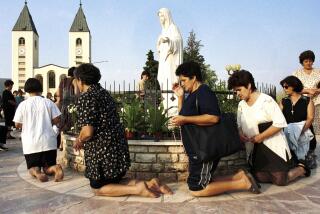Considering the Odds, ‘Miracles’ Are Strictly Ho-Hum Stuff
Alexander Pope, the 18th century English poet, captured the essence of science -- uncovering hidden order in the apparent chaos of nature -- in his 1734 “Essay on Man”:
All nature is but art, unknown
to thee;
All chance, direction, which
thou canst not see;
All discord, harmony, not
understood;
All partial evil, universal
good:
And, spite of pride, in erring reason’s spite,
One truth is clear, Whatever is,
is right.
As the publisher of Skeptic magazine and the “Skeptic” columnist for Scientific American, my job is to seek natural explanations for apparently supernatural phenomena, for which there is no shortage of belief. A 1996 Gallup poll of American adults, for example, found that 96% believed in God, 90% believed in heaven and 79% believed in miracles. A 2002 National Science Foundation survey reported that 60% of adult Americans believed in ESP, 40% thought that astrology was scientific and 30% believed in UFOs. One explanation for such high rates of belief may be that 70% of Americans still do not understand probability.
Although explanations vary greatly across the supernatural landscape, one especially effective tool is a principle of probability called the Law of Large Numbers, which states that an event with a low probability of occurrence in a small number of trials has a higher probability of occurrence in a large number of trials. We begin by defining a miracle as an event so improbable that the odds against it occurring are a million to one. Let’s then say that on any given 10-hour day in which we are alert and out in the world, we perceive things at a rate of about one per second, or 36,000 a day, or about a million a month. The vast majority of these percepts, of course, are completely unremarkable -- people walking by, cars driving past, conversations and the like. But one in a million may stand out as spectacularly unusual, perhaps extraordinary enough to call it a miracle, but it has a natural explanation.
For example, you are thinking about calling a friend when the phone rings and lo and behold, it’s your friend on the line. But how unusual, really, was that event. How many calls do you make a day, a week, a month? How many times did you think about calling that friend and he or she did not call you? How many times did the friend call you and you were not thinking about him or her? Multiply enough of these probabilities together and unusual things are bound to happen.
Death premonitions are in this same category of explanation. People report having a dream about the death of a loved one, for example, and shortly thereafter the dreamed-of person dies. What are the chances of that? Rare for any individual, common in a large population.
On any given night, psychologists say, each of us has five dreams; that’s 1,825 dreams a year, most of which we forget. If we remember one dream in 10, we have 182.5 remembered dreams a year. In an American population of 295 million, this results in a staggering total of 53.8 billion remembered dreams a year. Scientists tell us that we each know about 150 people fairly well, resulting in a network grid of 44.3 billion personal relationships. The annual U.S. death rate for all ages and causes is .008, or 2.6 million a year. It is inevitable that some of those 53.8 billion remembered dreams will be about some of these 2.6 million deaths among the 295 million Americans and their 44.3 billion relationships.
It would be a miracle, in fact, if some death premonition dreams did not come true.
The effect is enhanced by what is called the confirmation bias, in which we notice the hits and ignore the misses in support of our favorite beliefs (this accounts for the apparent success of psychics, astrologers, palm readers, conspiracy theorists and the like). If just a couple of people recount their miraculous dreams in a public forum, the supernatural seems validated. But it is nothing more than the laws of probability writ large.
Before we say something is supernatural, let’s first make sure it is not natural.
Science is the best tool we have for generating natural explanations. Let us apply it to all miracles and mysteries, great and small.






